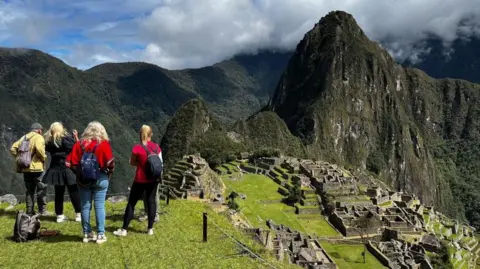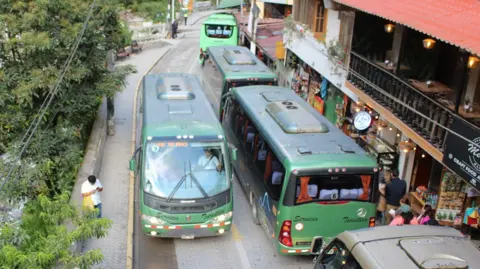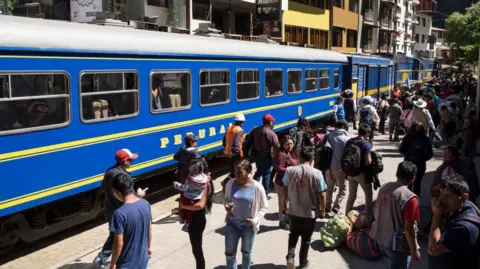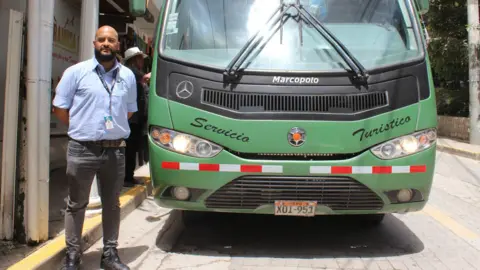Machu Picchu hit by a row over tourist buses
 AFP via Getty Images
AFP via Getty ImagesMachu Picchu, the remains of a 15th Century Inca city, is Peru's most popular tourist destination, and a Unesco world heritage site. Yet a continuing dispute over the buses that take visitors up to the mountain-top site recently saw some 1,400 stranded tourists needing to be evacuated.
Cristian Alberto Caballero Chacón is head of operations for bus company Consettur, which for the past 30 years has transported some 4,500 people every day to Machu Picchu from the local town of Aguas Calientes.
It is a 20-minute journey, and the only alternative is an arduous, steep, two-hour walk.
He admits that in the past few months "there have been some conflicts between people from different communities here".
This conflict revolves around Consettur losing its licence to a rival bus firm in this remote part of Peru, where, unless you want to hike over Andes mountains, the only access is by public transport.
To get to Machu Picchu without walking, tourists must first take a train to Aguas Calientes, which takes from two to three and a half hours. And then transfer to a bus for the final leg.
 Wilson Chilo
Wilson ChiloBack in September, local protestors angry that Consettur was being replaced following what they saw as an insufficiently open bidding process, blocked the railway line to Aguas Calientes with rocks.
This resulted in Peruvian authorities having to clear the tracks and evacuate tourists on special train services.
A number of local people, who didn't want to go on the record, say the protestors were unhappy that Consettur had a monopoly on the lucrative bus service, and that its position as sole provider was simply due to be transferred to new company San Antonio de Torontoy. A round-trip bus ticket costs $24 (£18) for a foreigner and $15 for a Peruvian.
Although Consettur's licence ran out in September, it is continuing to run its buses. And due to legal challenges, San Antonio de Torontoy has yet to start.
It's a complex situation, involving people from different local communities wanting a slice of the bus income, but Mr Caballero is adamant that Consettur is not a monopoly.
"The owners of the business have been running the company for the past 30 years, and they are people who come from around here," he says. "This is not a monopoly. Consettur is made up of 12 different companies with various partners."
These partners include the local district council, which owns 38% of Consettur.
Meanwhile, San Antonio de Torontoy is based slightly further away in the wider Urubamba Province.
 AFP via Getty Images
AFP via Getty ImagesAs the row and legal dispute over the buses rumbles on, Australian tourist Annalise Jaksic complains about the cost of the trains to Aguas Calientes. The cheapest round-trip ticket is $140, rising to $2,000 for luxury first class.
Speaking in Aguas Calientes, she says: "We thought it was one train [all the way to Machu Picchu]. And we thought if there was any more transport to get up there it would all be included, because you pay so much money for the train."
Her friend and travelling companion Todd Carland adds that buying the entry tickets for the site "was a nightmare for us". He says it was difficult to arrange because they weren't doing it through an expensive guided tour. A standard adult price for Machu Picchu is $57.
The mayor of Aguas Calientes, Elvis La Torre, is also unhappy about the tickets, because he says that most of the revenues do not stay locally.
"Only 10% of the ticket sales stay in the region. The rest of the money goes to the Ministry of Culture to look after other archaeological sites around Peru and pay for wages."
He wants more money to go to his community and the surrounding region to help improve tourism and fund more projects to help the locals. The Ministry of Culture was asked for a comment.
 Wilson Chilo
Wilson ChiloOutside on one of the side streets that are full of stalls offering tourism souvenirs, like fluffy alpacas and scarves, Dina Huillca is sitting on the pavement selling roses, tomatoes and mint. She travels from her village to get here, and says that "more needs to be done for the local communities".
She adds: "We don't have basic services like running water, or a hospital, and the schools need to be in better condition."
Carlos González is president of the chamber of tourism for this region of Peru, the Department of Cusco. He has an ambitious desire to see the state control of all public transport in Peru.
"We are pushing for an update in the law so that the vice ministry of tourism can take care of all the travel resources in our country," he says. "If we don't have a unified approach to Peru as a destination we can't be competitive in the long term."
He also wants to change tourists' experiences in Machu Picchu, with more entrances, and separate areas where different types of visitors can gather.
"[Such as] spiritual travellers going and having meditative rituals in one area," says Mr Gonzalez. "And let's not forget the younger crowd who are more inclined to do their Tik Toks and their stories for Instagram. They also need a place for doing that and enjoying themselves in a young fashion."
But he says that Peru's unstable national governments make change difficult. The country has had six different presidents in the past six years.
"I've been a leader of the tourism sector for five years now, and I have lost count of how many ministers, vice ministers and congress people I have spoken to."
Back in Aguas Calientes, Mr Caballero says he'd be happy to see both Consettur and San Antonio de Toronto run buses to and from Machu Picchu.
"If they are given the final approval we don't have a problem with working with them. We won't stop them."
